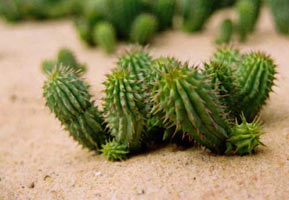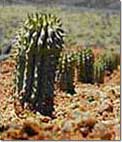|
|
Hoodia help us weight loss
|
|

Hoodia gordonii, "Whoo De AH", is the botanical name for a leafless, spiky succulent plant that grows throughout the semi-arid areas of Southern Africa primarily the Kalahari desert. The San (local inhabitants) have rationally used Hoodia stems to stave off hunger and thirst when on long journeys, as it acts as an appetite suppressant. Hoodia Gordonii was discovered and used by the San tribe from the Kalahari, South Africa, since prehistoric times. They chewed the bitter Hoodia plant twice a day to suppress hunger and thirst during long hunting trips. This plant contains the miracle molecule p57 that was recently translated into a obesity cure. It basically tricks the brain into thinking that you're full. The chemical constituents in Hoodia work within the satiety center by releasing a chemical compound similar to glucose but much stronger. The hypothalamus in the brain receives this signal as an indication that enough food has been consumed and this in turn stunts the appetite. The hypothalamus receives signal as an indication that enough food has been consumed and this in turn stunts the appetite. This pure organic Hoodia, contains a miracle molecule that, in effect, fools the brain into believing you are full, and even stops you from thinking about food. Hoodia enhances your mood therefore you will not become irritable or weak while you are on the program. The San Tribe could go without food for 24 hours after eating Hoodia, and in the same process hunt for food in the harsh Kalahari desert. It is therefore also known to maintain a high energy level. One of the active ingredients in the herb is a chemical compound called P57, which is thought to be at least partly responsible for the appetite-suppressing effects of hoodia gordonii. But this is probably an oversimplification, since herbs typically work with an assortment of chemical compounds, not just one chemical. For most people, the real weight loss challenge has relatively to do with dieting, exercise, supplements, or how many calories you burn in the gym. The real challenge is controlling their hunger drive. People who are trying to lose weight seem to share the exact same problem. They have trouble getting their appetite under control. Hoodia gordonii, it seems, could make that much easier. Because overcoming your own hunger drive seems almost impossible unless you get some help. When you eat hoodia, the saying goes, your hunger will simply be gone -- gone -- for around six hours. During those six hours, you won't crave anything. You really won't want to eat at all. The food still smells good, as usual, and they taste the same if you eat them, but you don't want to eat them! At least that's what the hoodia advocates claim will happen. The hunger signal is only turned off when your hypothalamus thinks you've eaten enough food. Your hypothalamus -- part of your body's endocrine system -- decides this by sensing the rise of sugar (glucose) in your blood. Eat enough carbohydrates, and your blood sugar rises, which convinces your hypothalamus to tell your brain that you're no longer hungry. Hoodia, however, contains a chemical that gets picked up by your hypothalamus which thinks it's glucose. And as it turns out, this chemical is reportedly 10,000 times more potent than glucose in triggering the chemical receptors in your hypothalamus, and so it only takes a tiny bit of this chemical to trigger the cancellation of your hunger signals. Hoodia pills are my life saver. I have a thyroid problem and this causes depression and weight gain. These pills take my hunger away so I can get back into shape and they make me happy, nice "side effect" ;-) Now my Doctor is taking them too! M S (Germany). Thank you, the second Hoodia Gordonii shipment arrived yesterday April 4, 2005. By the way Hoodia is working very well I lost 12 lbs or (5.5 kg) in 2 months. Not dramatic but then again losing weight slowly is the best way to go. At this stage I don't pay attention to carbohydrates, fats, sugars and other diet fads. Regards - G D B (USA) Hoodia is registered as a protected species to prevent Bio-Piracy but is allowed to be grown on a handful of commercial farms in South Africa owned by private farmers. The Hoodia Gordonii plant originated in the southwestern part of Africa and grows best in the semi-arid areas of South Africa primarily the Kalahari. In its native habitat it is extremely difficulty to identify because it looks similar to succulents of the same family of which there are many. Only an experienced botanist or as the case in South Africa with Hoodia Gordonii a San people can identify the plant prior to it's blooming. Independent tests conducted in Leicester, England on obese individuals from all walks of life have proved that over a 15-day period, food intake was reduced by 1000 calories a day. Mass global interest has been shown for Hoodia since Pfizer, the international pharmaceutical giant, started to research Hoodia's potential to help people with obesity. Pfizer recently discovered Hoodia and decided to invest millions into researching the plants benefits as a new drug that would help with obesity. The research published by this company has catapulted Hoodia into the international spotlight. Laboratory experiments show animals automatically restrict their food intake when taking hoodia orally. Rats, a species that will eat anything from meat and plants to indigestible fiber, lowered their dietary calorie intake to a degree that made them get thin when fed comparative amounts of hoodia. Hoodia Gordonii is a plant - a leafless succulent. Not a Cactus nor a Herb. In South Africa Hoodia Gordonii is classified as a foodstuff, which is testimony to how safe the product really is. Certainly any hoodia company out there that's selling an honest product is conducting a variety of testing, trying to find out who has counterfeit products and who has real products and trying to inform and educate their own customers about the fact that they have the real thing. But, as always, test results offered by companies who have financial interest in proving their product to be genuine simply don't carry the same weight as independent test results from an unbiased third company. Hoodia is also known by horticulture experts as being extremely difficult to cultivate in captivity. The plants rot easily, and they won't grow in regular soil -- they need sandy soil with excellent drainage. Also, to make things even more difficult, these plants aren't pollinated by bees, they're pollinated by flies. To attract the flies, their blooms emit a strong, repulsive odor that smells a lot like rotting flesh. All this means that if hoodia really catches on with the public -- the supply will be even tighter for many years. Prices are going to go up, and eventually, only the wealthy may be able to afford the pills necessary to lose weight.
Health recovery at european beauty clinic
|
|
Information on this web page named Hoodia help us weight loss and related to Hoodia, Weight loss is provided for informational purposes only and is not a substitute for professional medical advice. You should not use the information on this web site for diagnosing or treating a medical or health condition of Hoodia or Weight loss. If you have or suspect you have a medical problem, promptly contact your professional healthcare provider. Talk to your doctor, nurse or pharmacist before following any medical regimen to see if it is safe and effective for you. © Copyright 2007 United Kingdom Women Community, Weight loss area. |
